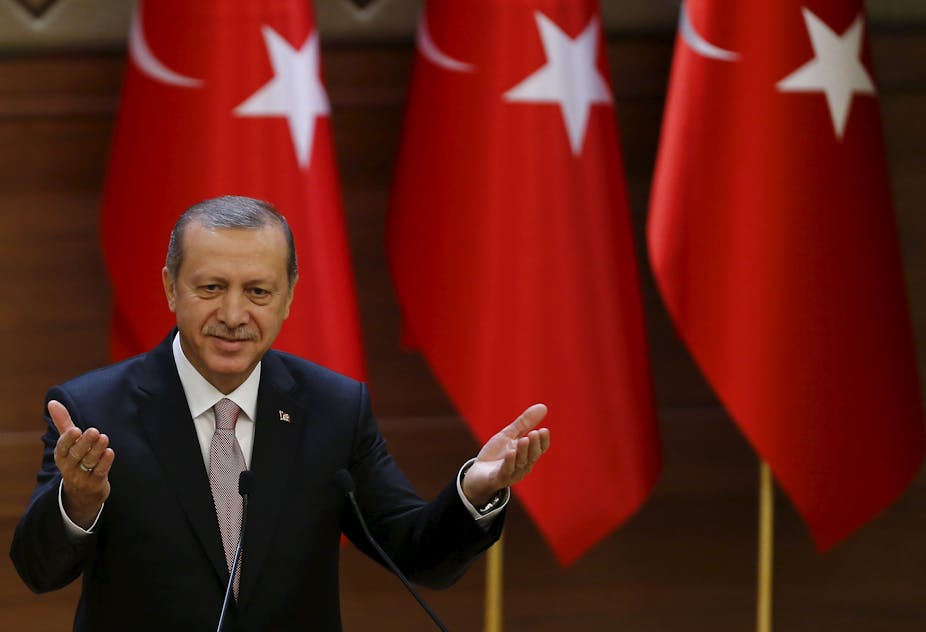Turkey has had a very dark beginning to 2016. Once again it was hit by a shocking terror attack, this time a suicide bombing on Istabul’s busy Sultanahmet Square that killed ten people and injured more than 15, including foreign tourists. The government immediately announced a blackout on any coverage of the attacks. President Recep Tayyip Erdoğan’s early remarks pointed the finger at Islamic State (IS), and ten Syrians have now been taken into custody in connection with it.
Whoever actually planned and executed the attack, it shows how Turkey is condemned to deal with its domestic and foreign policy faults in an increasingly tense and violent environment – and with a leader who makes much of the population increasingly nervous.
During the first days of 2016, President Erdoğan made international headlines thanks to a remarkably tone-deaf statement in which he appeared to [cite Germany under Adolf Hitler](http://www.nytimes.com/2016/01/13/world/europe/explosion-in-istanbul-tourist-district-kills-at-least-10.html (http://www.nytimes.com/2016/01/02/world/europe/turkeys-erdogan-seeking-a-more-powerful-presidency-cites-hitlers-system.html?_r=0 ) as a striking example of an effective presidential system.
Turkish officials sought to clarify his remarks: he had apparently meant to say that Nazi Germany was an example of a system run riot without proper checks and balances. But whatever his real point, the livid reaction illustrates the intensity of the suspicion that greets him both in Turkey and around the world.
Grand designs
Erdoğan has for years been agitating to implement a new presidential system to replace Turkey’s unicameral parliamentary democratic system. The current set-up clearly has various problems – an inert legislative system, lack of representation and an extremely high threshold for smaller parties to enter parliament – but Erdoğan is behaving as if there already is an executive presidential office, and as if he’s the country’s indisputable leader.
He not only exceeds the constitutional authority of his position but also manipulates the domains of the executive and the legislature which makes the political system much more off. His party’s decisive victory in the November 2015 election indicates that a large swathe of the electorate has gotten used this behaviour or even welcomed it, even as the rest are extremely concerned about this unmistakably autocratic direction.
This insidious project to change Turkey isn’t just political; it’s also social and cultural.
Both the AKP government and the Diyanet (Presidency of Religious Affairs) have been expending the role of religion into political life, and are increasingly making pronouncements on standards of daily life. This instrumentalisation of religion in a supposedly secular state is deeply controversial in terms of human rights and democracy, and it appals and worries many everyday Turks.
Minority groups have particular cause for concern; most recently it was the turn of the Alevis, the country’s second-largest religious group. Only a month after they were granted long-withheld religious freedoms, the Diyanet’s Mehmet Görmez said: “We have always had two red lines and we have never abandoned them. The first is the definition of Alevism as a path outside Islam, which contradicts 1,000 years of history. The second is defining Cemevis [Alevi houses of assembly] as alternatives to mosques as a place of worship.”

The Diyanet has also stated that engaged couples should not hold hands or spend time alone together during their engagement period, while Prime Minister Davutoğlu said that to make every Friday a religious celebration, the government will give civil servants time off work to attend the weekly Friday prayers in mosques – a gesture to religious freedom, but one that conspicuously only applies to the Muslim majority.
And then there came a distressing crackdown on freedom in another context. 1128 Turkish and international academics from 89 different universities – including Noam Chomsky and Immanuel Wallerstein – signed a petition to called on the government to end the security operations being committed in south-eastern Anatolia and to return to table for talks to resolve the Kurdish issue. Erdoğan reacted furiously to the petition and dismissed the signatories as “ignorant”.
Immediately after his sharp and aggressive speech, the Council of Higher Education and prosecutors began taking action against the academic signatories. Many have been interrogated; many more could lose their positions in universities. It’s another dire indicator that Turkey is rapidly turning into a one-man state.
Fear and loathing
Then there’s the renewal of the armed conflict with Kurdish separatists. Even during the long peace process, where a ceasefire gave some room to political discussions on the issue, the roots of the conflict were left untouched – and now, the situation is deteriorating.
The Human Rights Foundation of Turkey has announced that since August 16 2015, there have been “58 officially confirmed, open-ended and round-the-clock curfews in at least 19 districts of 7 southeastern cities (primarily Diyarbakır, Şırnak, Mardin and Hakkâri)”, home to over 1.3m people. During these officially declared curfews, the report says, “162 civilians (29 women, 32 children, 24 people over the age 60) lost their lives”.
The Turkish state undoubtedly needs to act against IS both inside and outside its borders, and it has a responsibility to uphold law and order. But its measures are drastically excessive, and they risk sparking a political war with many citizens. Freedom of thought and speech should not be glossed over.
Dealing with social polarisation, cooling the climate of violence and fear and restarting the Kurdish peace negotiations are all more urgent than ever. For the moment, it’s hard to find any cause for optimism.

